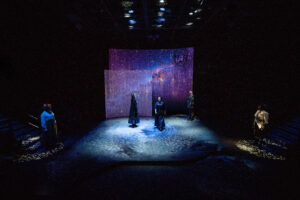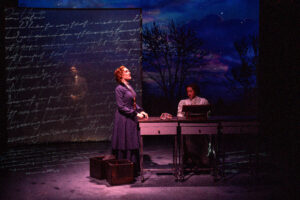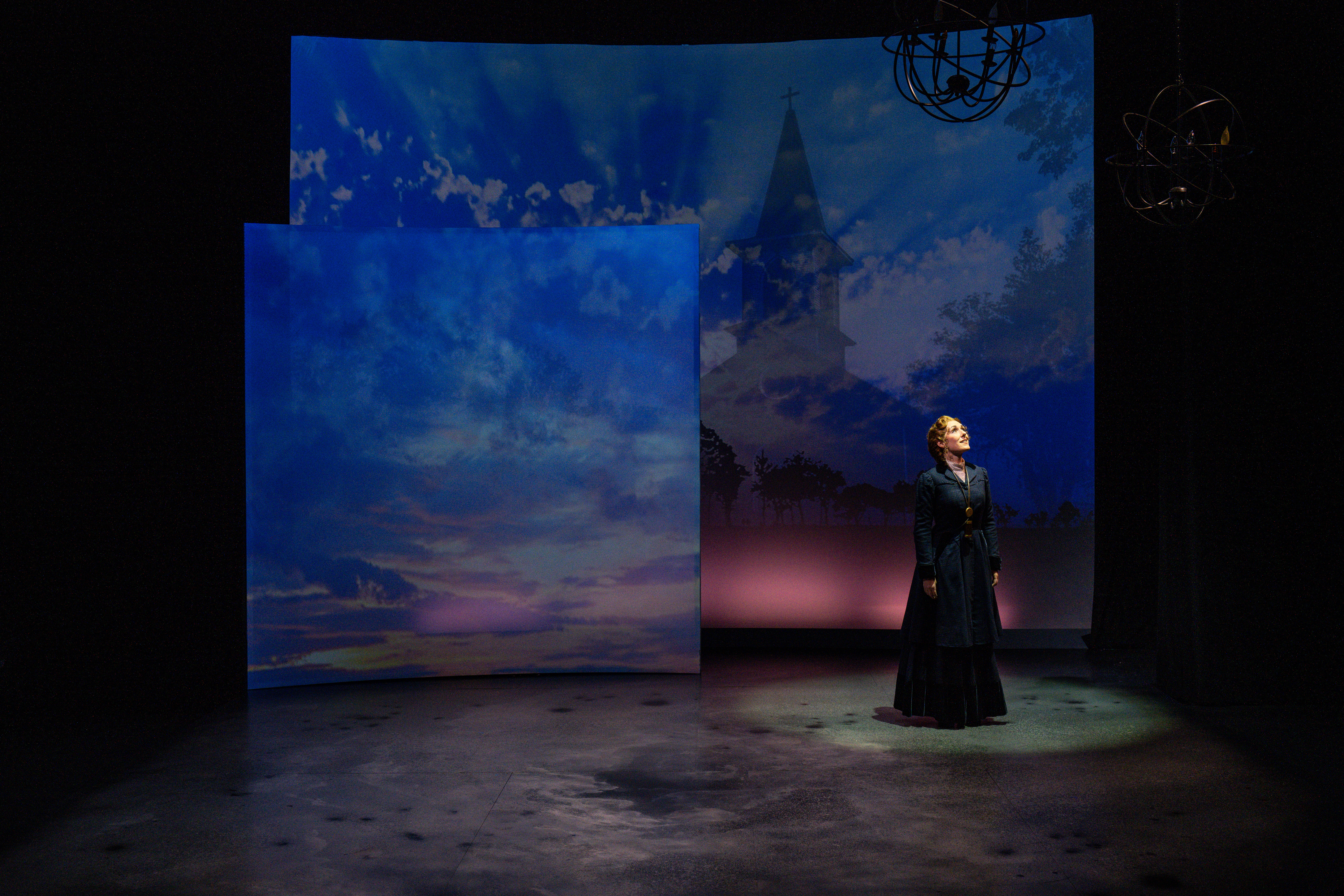CEDAR CITY — In her director’s note, Melinda Pfundstein says, “Through Gunderson’s Silent Sky, we explore permission and potential — internal or inspired by others — to experience, to live, to express, to contribute; to nurture the ability to think and feel all at once. We explore distance and separation, and connection and shared light. We witness the breaking, not only of glass ceilings, but also perhaps breaking down the walls around the heart.” Having this from the director gives such keen insight into the excellent staging Pfundstein has done in exploring how immersive one can be in the universe of their own mind and heart. Utah Shakespeare Festival’s production of Silent Sky, by American feminist playwright Lauren Gunderson was of infinite depth and quality.
The show centers on this true story of Henrietta Leavitt’s astronomy career and discoveries that led modern scientists to grasp the expansive distance of the known universe. Henrietta, despite her skills and accomplishments, is relegated to being a “computer” who is not allowed to use the telescope to explore her own scientific interests. She is not alone. Two other brilliant women, namely Annie Cannon, played by Alia Shakira, and Williamina Fleming, played by Sarah Shippobotham, are likewise disregarded despite incredible contributions to the field. Through the play, Henrietta must navigate advocating for her professional ambitions while being pulled by familial duties and romantic love.

From the moment Katie Cunningham entered the stage as Henrietta, I was astounded by her clarity of speech. Her vocal training was on full display as she spoke with crystal clear enunciation and filled the Anes Studio Theatre space. Henrietta is not an unfeeling character, but she has goals that she will not allow to be interrupted. Cunningham grasped this aspect of her historical character so well. Only in brief glimpses would Cunningham allow the audience to peer into the emotional life of the character. In one instance, a memory is acted out where she engages in a passionate kiss, but the instant she is disrupted, the moment passes and she carries on. In many ways, this understated emotion is powerful. It feels so often that Henrietta must choose between the scientific distance she’s exploring and the personal connection she so longs for with her family, romantic interest, and even her dear colleagues. Cunningham was the physical and vocal embodiment of Pfundstein’s director’s note. Contrast and exploration in so many uplifting and sorrowful ways.
Pfundstein’s direction was instrumental to the success of this show. Desks on wheels that could be moved as actors were in conversation about the orbits of celestial bodies allowed the space to feel like a panoramic planetarium in the intimate thrust stage space. Brilliant blocking along side a crisp lighting and projection design allowed the audience to shift from what was literally happening, to high level scientific thought in seamless transitions. Joe Payne’s projection design utilized full space projection mapping that shone stars and interstellar stuff through the production’s headiest moments. The projections upstage of the actor’s playing space were split onto two screens, which allowed the foremost one to block actor exits and entrances while keeping a unified view of the setting and space.
So, too, for Jaymi Lee Smith and Tom Mays’ lighting design. The play covers decades of time, hundreds of miles of early geography, and lightyears physical space in the exploration of the characters. There is just as vast an emotional range in the play and the lighting so often aided to the story with cool blues, warm purples, and even dull tones in the moments when Katherine is in deep personal conflict.

Peter Shaw, who is both Henrietta’s boss and her love interest, is played by Abdul-Kaliq Murtadha. Murtadha has the difficult task of being both the unyielding embodiment of the glass ceiling keeping Henrietta from further exploration — or even credit for her own work — while also being her complicated, yet believable, love interest. Murtadha does this by embracing the awkwardness the character feels in these situations. There are beautiful sequences where Henrietta and Peter can only correspond through letters. Their shared, looping cursive overlaps in projections on the upstage screens, and while there is no eye contact or physical closeness, there is now doubt of their feelings. Murtadha, in these fragments, shows a whole romantic flame and fizzle in a few short lines, ending painfully with his letter no longer being addressed to Henrietta, but to “Miss Leavitt.” Murtadha leaves no ambiguity to these words, and while their physical proximity doesn’t change, their emotional separation becomes unbreachable.
So much of what works about this play comes from simply seeing it. It would be so easy to let this text feel like the responses to Paul Tsonga’s quotes about no one wishing on their deathbed that they’d spent more time in the office. Henrietta, in some ways, does wish this. But be it through strong directing, acting, or some combination of theatrical elements, Henrietta’s story feels like a joyful, even hopeful, triumph that there is so much more to the universe than are dreamt of in many philosophies.
I’ve seen a handful of plays in the Anes Studio space, but this one is up with Coriolanus as one of the most successful. Black box theaters provide so much opportunity to immerse the audience in an intimate story. The Utah Shakespeare Festival production of Silent Sky feels both intimately personal and infinitely expansive.
[box]Silent Sky plays through October 5 in the Eileen and Allen Anes Studio Theatre (101-199 University Blvd, Cedar City). Tickets are $50-60. For more information, visit bard.org [/box]
